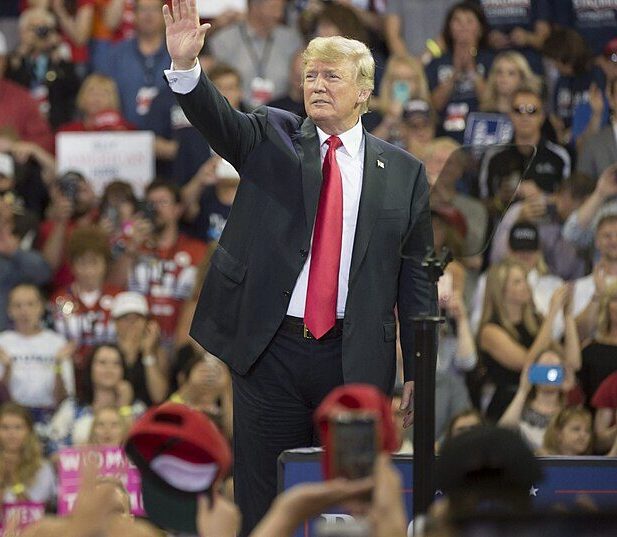CTSP2020, CC BY-SA 4.0
New Allegations Suggest Secret Service Refused Drone Assistance, Leading to Security Failures
On July 25, 2024, U.S. Senator Josh Hawley (R-Mo.) sent a follow-up letter to Department of Homeland Security (DHS) Secretary Alejandro Mayorkas, demanding the release of all records related to the United States Secret Service’s (USSS) use of drones during former President Donald Trump’s rally on July 13. This letter follows new whistleblower allegations indicating that the Secret Service refused to utilize drone technology for securing the event, a decision that may have contributed to the security breach resulting in an assassination attempt on Trump.
According to Senator Hawley’s letter, a whistleblower alleged that the night before the rally, the Secret Service repeatedly declined offers from a local law enforcement partner to deploy drones for security purposes. The whistleblower claims that the technology was available and could have been utilized to enhance security at the rally. Instead, the Secret Service allegedly requested the drone technology only after the attack occurred.
Site of the Butler Trump Rally, 2024Designism, CC0, via Wikimedia Commons
“According to one whistleblower, the night before the rally, U.S. Secret Service repeatedly denied offers from a local law enforcement partner to utilize drone technology to secure the rally. This means that the technology was both available to USSS and able to be deployed to secure the site. Secret Service said no,” writes Hawley. The whistleblower further alleged that after the shooting took place, the Secret Service “changed course” and asked the local partner to deploy the drone technology to surveil the site in the aftermath of the attack.
These allegations have intensified scrutiny of the Secret Service’s actions on the day of the rally. On July 13, Thomas Matthew Crooks, a 20-year-old gunman, opened fire from a rooftop near the rally, resulting in one death and serious injuries to two others. Former President Trump sustained an injury to his right ear but managed to appear at the Republican National Convention days later with a bandage over his wound.
Senator Hawley has been a vocal critic of the Secret Service’s security measures during the rally. His recent letter follows an earlier one demanding answers about why law enforcement officers abandoned their posts on the rooftop from where Crooks shot. “The American people deserve answers about your historic failure to protect former President Trump on July 13, 2024,” writes Hawley.
The incident has raised significant questions about the role of drones in protecting high-profile events. In a previous article on DRONELIFE, it was noted that drones could have been instrumental in detecting and neutralizing threats from elevated positions. During a podcast, Senator Ted Cruz criticized the Secret Service for not deploying drones and questioned the advance team’s failure to identify the rooftop’s sloped nature, which made countersnipers ineffective.
House Speaker Mike Johnson emphasized the necessity of drones for such events, stating, “It is standard practice now for drones to be in the air over an event like this.” The Federal Aviation Administration (FAA) confirmed that the Secret Service did not request Special Government Interest (SGI) waivers to fly drones over the event, a missed opportunity to utilize drone technology for enhanced security.
The incident has also highlighted the limitations of counter-drone technology. Although shooter Thomas Matthew Crooks reportedly used a commercial drone to survey the site before the attack, the Secret Service did not employ effective counter-drone measures that might have identified the unauthorized aircraft.
In the wake of the attack, President Joe Biden ordered an independent review of the shooting, promising transparency with the American public. Additionally, the DHS inspector general has initiated an investigation into the Secret Service’s handling of the incident.
As investigations continue, it is crucial to address the gaps in security measures to ensure the safety of public figures and attendees at high-profile events. Former Secret Service Director Kimberly Cheatle, who resigned after the incident, acknowledged the shooting as “unacceptable” and emphasized that such a breach “shouldn’t happen again.”
The Butler rally shooting underscores the evolving challenges of securing high-profile events in an era where technology like drones can play a pivotal role. Understanding and addressing these gaps is essential for future security operations.
Read more:
Miriam McNabb is the Editor-in-Chief of DRONELIFE and CEO of JobForDrones, a professional drone services marketplace, and a fascinated observer of the emerging drone industry and the regulatory environment for drones. Miriam has penned over 3,000 articles focused on the commercial drone space and is an international speaker and recognized figure in the industry. Miriam has a degree from the University of Chicago and over 20 years of experience in high tech sales and marketing for new technologies.For drone industry consulting or writing, Email Miriam.
TWITTER:@spaldingbarker
Subscribe to DroneLife here.

